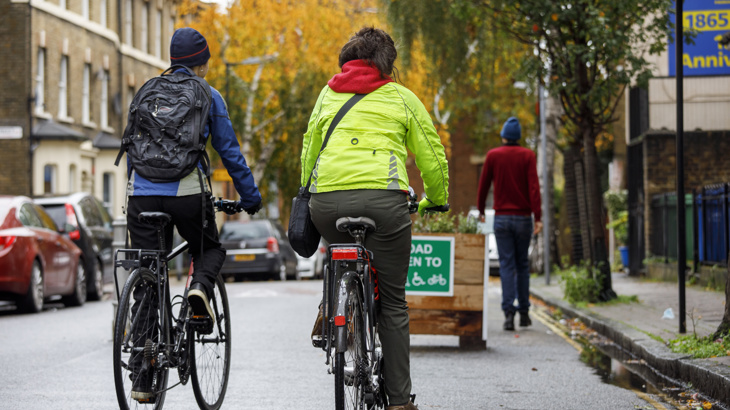Our guest blogger Emma works for Age UK Camden as a Social Prescribing Link Worker. We asked Emma to explain what social prescribing is, how it supports people to improve their health and wellbeing, and how she's working with Sustrans to introduce a group of patients to cycling."

Emma, a Social Prescribing Link Worker and our guest blogger. Credit: Submission/Sustrans
What is social prescribing?
It’s a prescription (or referral) from a health care professional such as a GP or nurse, which doesn’t take the form of medicine or clinical treatment.
It prescribes lifestyle changes which will help to address the underlying root causes of a patient’s symptoms.
Social Prescribing Link Workers (Link Workers) like me are based in GP practices and we support patients to access a range of local, non-clinical services.
Link Workers are afforded the time it takes to get to know the whole person and understand the range of social, environmental and economic factors that affect them.
What does a social prescription look like?
A social prescription can address a patient’s physical, mental and/or social health.
The prescription can take many forms.
For example, a Link Worker may:
- Support a patient who wants to lower their cholesterol, to increase their physical activity by joining a walking group.
- Support a patient who is experiencing a dip in their mental health, by listening to them and supporting them to adopt habits which could improve their wellbeing, such as following a daily routine.
- Support a patient who is struggling to apply for work, to access local support services for CV and application writing.
What does a Social Prescribing Link Worker do?
We build trusting relationships with our patients, learning about what matters to them.
Together we write a plan to improve their health and wellbeing, troubleshooting the barriers which stand between them and their goals.
We then support patients to access a range of different services, because in many cases it’s not enough to point someone in the general direction of support.
They need a practical, helping hand to navigate unfamiliar environments or application forms, to ensure they can get the most out of a particular service.
I don’t just help patients to address their problems, I also celebrate their strengths.
Because self-esteem and self-belief are powerful ingredients for change.

Credit: Crispin Hughes/Sustrans
What impact does social prescribing have?
Often patients are viewed as a list of symptoms to be resolved or managed.
It’s a situation which can leave a person feeling disempowered and passive about their ability to have any influence over their own health.
So for starters, a social prescription encourages a patient to take charge.
To give you some examples, one of my patients was referred to me after they’d been signed off work with stress.
They were experiencing issues with their family and lived in very unsuitable accommodation.
I first supported them to secure housing support and then introduced professionals to help with their family situation.
We then focused on the patient’s mental health, which I prescribed a bike for.
The patient used this bike to visit friends.
A combination of these visits and physical exercise, really improved their mental health and sleep immensely.
This patient is now back at work and seeking longer term therapeutic help for their mental health.
I helped another patient gain permission from their housing association to have a dog in their property.
Caring for and walking a dog, significantly helped to ease this patient’s anxiety and improved their mental health.
My job is about finding how to unlock the potential for positive change in someone’s life.
And the difference that a social prescription for something as simple as a bike can make, never ceases to amaze me.
What barriers do you meet with patients?
I find barriers tend to fall into three categories, circumstantial, systemic and personal.
Circumstantial barriers are the circumstances or responsibilities of a patient’s life standing in the way of them putting their health and wellbeing first.
For example, a patient might be a carer for someone whose needs are unpredictable.
Systemic barriers are wider, external factors limiting a patient’s access to what will improve their health and wellbeing.
For example, a patient may not fulfil the criteria to receive support or funding for an intervention they need, which is incredibly frustrating for me as their Link Worker.
Personal barriers are when the patient doubts the effectiveness of their social prescription or their own ability to make change possible.
For example, I might encourage a patient who wants to improve their mental health to take up cycling but it might take finding them friends to cycle with to offer them the confidence to see this prescription through and discover the resulting benefits.

Credit: Keith Brame/Sustrans
Have your own experiences shaped your role as a Social Prescribing Link Worker?
I’ve never considered myself a very active person and like some of my patients I’ve gone on a journey to change my relationship with exercise.
It’s taken perseverance and the support of others for me to establish my own routine, which now includes cycling for my everyday journeys.
My own experience means that I can really relate to the fear and discomfort that patients share with me when they are trying to change their lifestyle and habits.
I know how hard it is to keep going, but it’s a joy to help patients maintain their motivation, just as others did for me.
I absolutely love my job as a Link Worker.
It has so much variety and creativity because everyone has a different story and different hopes and goals when it comes to their health.
How have you been working with Sustrans?
Sustrans has been working as Transport for London's delivery partner for their Healthy Streets Officers programme.
And together with Peddle My Wheels and Age UK Camden we have been working on a pilot scheme for the social prescription of bikes.
10 patients in the pilot have been offered a free 3 month bike loan to support their health and wellbeing.
This was initially conceived during the first Coronavirus lockdown to help patients get out of the house to improve their mental health and reduce isolation.
Sustrans has supported us by providing funding, publicity and the evaluation for the project.
They also introduced us to Peddle My Wheels, a business recycling used cycles, who supplied and managed the patients' bikes.
It’s been a really positive project, we’re just coming to the end of the final loans now so are ready to head into evaluation.
What benefits have these patients gained through cycling?
Getting bikes to people who would never have been able to afford them has been such a gift to their health and wellbeing.
The outcomes have been truly amazing to see but I’ll let the patients tell you in their own words:
“The bike is a big thing. You feel so good, even after 10 or 15 minutes on it.”
“When you ride a bike you forget everything. You forget about all problems and feel happier.”
“I felt really good about myself, that I’d achieved something.”
“It improved my self-esteem.”
“My body and legs are stronger.”
“I felt alive. It gave me a reason to live.”

Credit: Crispin Hughes/Sustrans
What are your hopes for the future of social prescribing?
I hope that social prescribing is able continue to support GPs and their practices.
1 in 5 GP appointments are about non-medical issues.
So the need is very present for practitioners like me to step in and support both GPs and patients.
I know locally we have the full support of GPs because they see the difference we’re making to their patients’ health and wellbeing.
Ultimately, I hope the evidence base for the effectiveness of social prescribing increases so that Link Workers can be resourced to support many more people nationwide.
About Emma
Emma works for Age UK Camden as a Social Prescribing Link Worker in the South Camden Primary Care Network, which is a group of three GP practices in and around the Holborn area.
About Healthy Streets Officers programme
Sustrans and Transport for London have been working with Camden Council to support more people in the borough to cycle, both for transport and to improve their health.
The work is part of the London-wide Healthy Streets Officers programme which works to make cycling something that everyone feels they can do.
The Healthy Streets Officers programme is funded by Transport for London and delivered by Sustrans.





